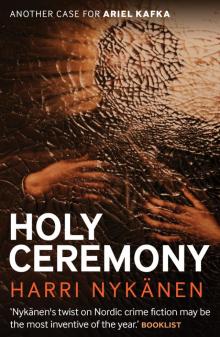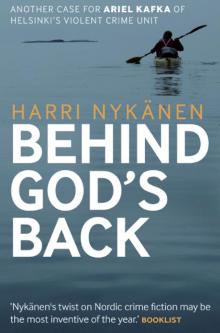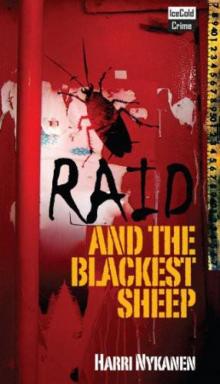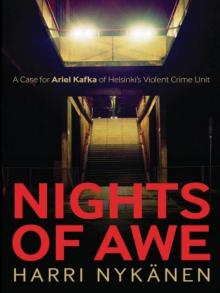- Home
- Harri Nykanen
Behind God's Back
Behind God's Back Read online
Harri Nykänen, born in Helsinki in 1953, was a well-known crime journalist before turning to fiction. He won the Clue Award for Finnish crime writing in 1990 and in 2001. His fiction exposes the local underworld through the eyes of the criminal, the terrorist and, most recently, from the point of view of an eccentric Helsinki police inspector called Ariel Kafka. This is the second in the Ariel Kafka series to appear in English. It follows on from the success of Nights of Awe.
Also available from Bitter Lemon Press by Harri Nykänen:
Nights of Awe
BITTER LEMON PRESS
First published in the United Kingdom in 2015 by
Bitter Lemon Press,
47 Wilmington Square, London WC1X 0ET
www.bitterlemonpress.com
First published in Finnish as Jumalan selän takana by Werner Söderström Corporation (WSOY), Helsinki, 2009
Bitter Lemon Press gratefully acknowledges the financial assistance of FILI – Finnish Literature Exchange and the WSOY Literary Foundation
© Harri Nykänen 2009
English translation © Kristian London, 2015
All rights reserved. No part of this publication may be reproduced in any form or by any means without written permission of the publisher
The moral rights of the author and the translator have been asserted in accordance with the Copyright, Designs, and Patents Act 1988
All the characters and events described in this novel are imaginary and any similarity with real people or events is purely coincidental.
A CIP record for this book is available from the British Library
eBook ISBN 978–1–908524–430
Typeset by Tetragon, London
Contents
Prologue
Chapter 1
Chapter 2
Chapter 3
Chapter 4
Chapter 5
Chapter 6
Chapter 7
Chapter 8
Chapter 9
Chapter 10
Chapter 11
Chapter 12
Chapter 13
Chapter 14
Chapter 15
Chapter 16
Chapter 17
Chapter 18
Chapter 19
Chapter 20
Chapter 21
Chapter 22
Chapter 23
Chapter 24
Chapter 25
Chapter 26
Chapter 27
Epilogue
PROLOGUE
After continuing for a month, Operation Jaffa joined that echelon of rare Security Police operations about which exaggerated tales would have been told to grandchildren, had it only been allowed. One could predict the same sort of legendary glow for Jaffa as the battles of the eastern front held for veterans of World War II, or the round-the-clock monitoring of the Soviet embassy (known as Hustler duty) held for the old-timers from the Security Police.
Three weeks into the operation, some investigator on a five-cup coffee high invented a new name for it in the quiet hours of the night. And like a bad case of athlete’s foot, it immediately spread into common use. On paper the operation continued to be known as Jaffa, but in the field it had a less dignified appellation: Operation Haemorrhoid.
The nickname was like a shortcut across a lawn. Using it was forbidden, but prohibitions and interdictions proved completely ineffective at preventing trespassers. In such cases, it was wisest to give up or build an impassably high fence.
The appropriateness of the name was revealed the first time you spent a few hours without a break on the hard-edged, unpadded kitchen chair.
The two-room flat with a kitchenette had been rented solely for Operation Jaffa. One room was furnished with a folding bed and two stools; the other, which looked out onto the street, contained a table covered in coffee-cup rings, as well as the aforementioned kitchen chair and a couple of its siblings. The chair had been set up in front of the window. A tripod stood next to it, holding a powerful video camera equipped with a spotting scope. The window was covered by a screen of blinds, and a floor-to-ceiling stretch of dark fabric hung behind the chair. Anyone in dark clothes sitting at the window was almost impossible to spot from outside.
A glance through the telescope revealed that it was trained on a storefront across the street. Nothing on the window or door of the storefront indicated what sort of enterprise was contained within its walls. Officially, Cemicon Ltd., a representative of the Israeli chemical industry, operated on the premises. Its product selection included motor oil additives, rust inhibitors and insecticides.
The company had only one employee: the Israeli citizen Leo Meir. Meir did not have a permanent residence, so he lived at his place of business. Which was precisely why the decision had been made to watch the property twenty-four hours a day.
Despite the fact that Meir had an interesting background, the Finnish Security Police wouldn’t have gone through the trouble of opening a file on him and setting up a dedicated operation had they not received a tip from the intelligence contact at the US Embassy. According to “reliable sources”, Leo Meir was in Helsinki to lay the groundwork for a high-profile assassination.
Unfortunately, though, even the omnipotent CIA did not know whom Meir was supposed to kill. All they knew was that he was under orders to act by mid-September.
That gave the Security Police a little over a month to find the target and stop the murder.
1
I used up my fifteen minutes of fame in the first week of August. Within a three-day period, I was interviewed by morning television, the evening news, a radio talk show and the tabloids. I felt like a VIP, and waited for the notoriety to rush to my head.
I quickly came to find that fame has its advantages. The old sourpuss from downstairs gave me something resembling a smile, and when I rode the tram in to work, a good-looking young woman shot interested glances my way.
I could almost understand those people who sold their self-respect and their souls for a pittance on Big Brother, Fear Factor, or one of those other degrading television shows.
I had to admit to myself, though, that my popularity was due to of a string of coincidences. It all began when Seeds of Hate, an extremist organization that had sprung up out of nowhere, kidnapped and assaulted a professor who was researching racism at the University of Helsinki. The bruised and battered scholar had been found wandering the woods north of the city in his underwear.
The case was an unusual one in Finland. The lead investigator was Detective Kari Takamäki from the neighbouring unit, but Takamäki, who coached his son’s ice hockey team, took off for Iceland and vanished. Apparently the volcanic soil and magnetic fields prevented cell phones from functioning properly. Either that, or Iceland’s teleoperators were as deeply troubled as their banks. Takamäki remained unreachable.
Meanwhile, my supervisor, the head of the Violent Crimes Unit, was in New York on a romantic getaway with his girlfriend. From a suite in his high-rise Manhattan hotel, he ordered me to handle communications on the case. Chief Detective Huovinen thought I was the right man for the job, since the kidnapped professor was a Jew – just like me.
Apparently Seeds of Hate harboured a particular animosity for us, as half a dozen prominent Jews had received abusive, threatening letters signed by the organization. Still, not even the Security Police knew who the individual or individuals behind Seeds of Hate were. The investigation had got nowhere.
My fame evaporated as quickly as it had materialized. Takamäki emerged from his cell phone dead zone and reassumed responsibility for communications. I took my vacation, which I had split up into three stretches: two in the summer and the third in winter. That gave me something to look forward to.
For some pe
ople, the first Monday after a long summer vacation is deathly depressing. For me, it wasn’t any more so than any other day. I had already taken two weeks of vacation in May, then these three weeks in August. When I came back to work, it was the end of the month and only a few magical, dew-misted nights from autumn – not that autumn was like the autumns of my childhood any more: the Finnish school year, in defiance of all natural laws, began in August now.
Since despite my family’s matchmaking attempts I remained a bachelor, and thus a creature verging on the pathetic, my brother Eli had invited me to his summer cottage – which the world cottage was twenty times too modest to describe. I guess he figured I would soak up influences that would spark a desire for the family life. After all, establishing a family and reproducing are central tenets of Jewish existence; they are commandments given by God to man, and not to be shirked. Jewish parents live more for their children, grandchildren and great-grandchildren than for themselves. The future is more important than the present, and without children, there is no future.
I was able to stand Eli for almost a week. I came back to town and lolled around for the next seven days. During my final week of vacation, the weather was gorgeous, so I spent it at sidewalk cafes, reading late, watching rental movies and sleeping in. It was exactly what vacations were originally supposed to be: completely pointless, but relaxing.
The Tuesday that followed the Monday was ordinary, too. I cleared my desk of the mail and preliminary investigative material that had accumulated there during my time off.
On Wednesday, my work began in earnest.
I was just about to head downstairs to eat when my boss stepped into my office. Chief Detective Huovinen was in his shirtsleeves, but he was wearing a sharp-looking bronze-coloured tie. A former male model, Huovinen always looked polished down to the tips of his toes, as an old-fashioned style guide might say.
“You just got a gig. Take Simolin with you and head out to Tammisalo. It should be right up your alley.”
“How so?”
“Half an hour ago a man was shot at his front door. Evidently the perpetrator was pretending to be a police officer.”
“And what makes it up my alley?”
Huovinen folded his arms across his chest and frowned. “The victim’s name is Samuel Jacobson. You know him?”
“Yes.”
Jacobson owned a chain of office supply stores. He was also prominently involved in the activities of Helsinki’s Jewish community. He was over twenty years older than me, so I mostly knew him through the congregation. He had played soccer at the national level as a young man. When I was eighteen, I had dated his daughter Lea for a few months; she and I went to the same high school. It didn’t take long for me to realize that Samuel Jacobson had absolutely no desire to become my father-in-law. I haven’t had much luck on the son-in-law market since.
“It can’t hurt the investigation that you know Jacobson and his circle – at least better than anybody else on the force. Jacobson must have got mixed up in something. He wasn’t robbed, and the perpetrator clearly wasn’t some crazy junkie killer who just happened to end up on his doorstep. Seems like a tricky case. Does Jacobson have a family?”
“A wife and two kids, a son and a daughter. The son works in the family business, the daughter lives abroad.”
I considered whether or not I should mention that I had dated Lea, and decided not to.
“OK. Take the case, then… unless there’s some reason why you can’t… something I should know about.”
“Nope.”
On the way to eastern Helsinki, I spent a minute reflecting on Huovinen’s question. Helsinki’s Jewish community was small, and all of its members more or less knew each other. That was no reason to excuse myself from the case. All the residents of a small town know each other, too, and that doesn’t disqualify the local police from doing their jobs. Still, a boss other than Huovinen might have suspected Jews of having some secret pact of mutual assistance, something that would prevent them from telling the truth if another Jew were involved in a case.
My relationship with Lea had come to an abrupt end when someone blabbed that, after a party at my friend’s, I had stayed behind with Karmela Mayer, the daughter of the fur shop owner. I had dated Karmela for over a year, and had almost ended up under the chuppah. Karmela lived in Israel these days, and had three children. I still had restless dreams about her large breasts. Lea also moved to Israel later and married a wealthy entrepreneur, or at least that’s what I remembered someone telling me. That’s the extent of what I knew about her family life.
I had dated three other Jewish girls and screwed up those relationships, too. When you added one-night stands, if you wanted to draw a hard line, I was disqualified when it came to every single Jewish family in Helsinki.
Detective Simolin drove in silence, looking a little uncomfortable. He probably blamed himself for my reticence. Simolin was a good police officer, but so inherently innocent that he often found himself coming up against life’s realities. He was fascinated by North American Indians. He even had an Indian name, which he wouldn’t tell anyone, and a set of buckskins complete with moccasins and a feathered headdress. He also had a genuine Indian bow and a steady hand. Simolin would have never confused the Crees of the northern plains with the Crows of the central plains because he was an expert on Indian tribes, their territories and ways of life. In addition, he was an enthusiastic astronomer, and had built his own reflecting telescope. Had he lived in the ’50s, it was easy to imagine him devouring those hobby magazines for boys and building all the gadgets they featured: rudimentary receivers, soapbox radios and microscopes. But these days, such enthusiasm was old-fashioned and naive.
“Huovinen told me that Jacobson was Jewish. Do you know him?” Simolin asked.
“Yeah. Not well, but a little. I used to date his daughter back in the day, but only for a few months.”
“Really?” Simolin sounded excited. “I’ve heard his name somewhere. Was he retired?”
“Not that I know of.”
Simolin frowned. “Huh. Then what was he doing at home in the middle of the day?”
“Beats me.”
The thought hadn’t even crossed my mind. But it had crossed Simolin’s, and before continuing he paused for a moment, as if waiting to hear my opinion of his observation before offering his own. Simolin wasn’t ambitious that way. He let others shine.
“It occurred to me that the murderer might have been dressed like a policeman because Jacobson was afraid of something and wouldn’t have opened the door otherwise. And that’s why he didn’t go to work either.”
“Jacobson didn’t strike me as the type that anyone would want to kill.”
“And yet someone did,” Simolin pointed out. “And in a police uniform, too. I had time to do a little checking – there are three known cases in Finland where a police officer’s uniform has gone missing. That’s not very many. Two were in the Helsinki area, one in Lapland.”
“If it even was a police uniform. People think anyone in a dark-blue uniform and a cap is a police officer.”
“True enough,” Simolin admitted.
“You already take your vacation?” I asked, after we drove a moment longer in silence. We were just passing through the neighbourhood of Herttoniemi.
“Two weeks. I’m saving the rest for winter. I’m going to travel to the States for two weeks.”
“Alone?”
Simolin appeared to be blushing.
“With my girlfriend… We’re going to go visit this one Indian tribe. They have a big celebration around that time. Everyone dresses in traditional ceremonial garb, and the men perform the buffalo dance. It’s not your run-of-the-mill tourist show.”
“That must be an amazing experience.”
“I’ve been saving up for this trip for almost two years.”
I knew that Simolin didn’t discuss his Indian pursuits with anyone at work except me. Maybe he figured that, being a Jew, I understood o
ther minorities. But the fact was I had never poked fun at his interest in Indians. Sometimes we’d talk about the stars and space, too.
The infinity of the universe impressed everyone, but it aroused endless awe and admiration in Simolin. Words never sufficed to explain what he’d seen the previous night through his reflector telescope. He’d spotted the rings of Saturn, or the Horsehead Nebula of Orion. Such things reminded you how small and finite man’s existence truly is, Simolin had confessed during one late-night shift.
“Did Jacobson have a family?” he asked. “Oh, that’s right, you dated his daughter.”
“Wife and two grown children.”
“Do you want me to talk to the daughter if there’s still something between you guys? Or maybe Arja can? She’s coming out, too.”
“Lea’s still in Israel. Besides, it’s not a very delicate subject any more. It’s been over twenty years.”
We turned towards Tammisalo, leaving Herttoniemi Manor behind to the right. The Jacobsons had lived in Tammisalo back when I dated Lea, and on several occasions we had taken walks in the manor grounds. It had been August, and there on the lawn, under cover of the balmy darkness, I tried to get into her pants. Even though things always started out promisingly, Lea would eventually put on the brakes. My efforts weren’t rewarded until a little before our relationship came to an end. It had been at the Jacobson summer cottage in Emäsalo, where we spent a weekend without old man Jacobson’s knowledge.
As I took in the familiar scenery, I remembered how I used to ride the blue Tammisalo Transit bus to pick up Lea. Back then, it had felt like I was travelling to the countryside: the houses had been old and dilapidated and their orchards large. Now they had been subdivided, and the road was lined with brick homes, each one grander than the next.
We crossed the bridge, circled the roundabout, and turned towards the shore.
“Pull up next to that fence,” I told Simolin. The Jacobson residence was a boxy, flat-roofed brick house built in the 1970s. Samuel Jacobson had commissioned it himself, and in the end he died in the doorway of his own home. Much to my surprise, he was still lying there.

 Holy Ceremony
Holy Ceremony Behind God's Back
Behind God's Back Raid and the Blackest Sheep
Raid and the Blackest Sheep Nights of Awe
Nights of Awe